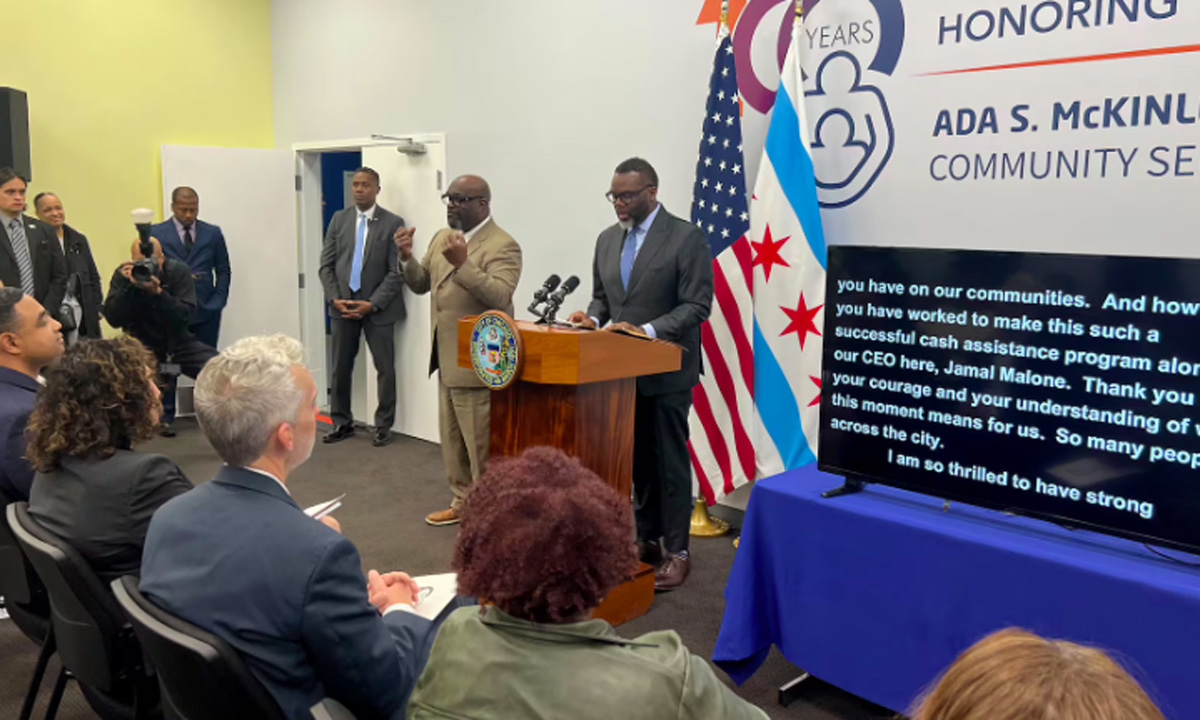Chicago Extends Deadline for $500 Grants to Help Families of Students with Disabilities
The cash grant is meant to provide some relief for students and parents with additional needs who faced challenges during the pandemic.

Get stories like this delivered straight to your inbox. Sign up for The 74 Newsletter
The City of Chicago has extended a deadline for low-income families to apply for at least $500 if they have children with disabilities — a cash grant effort meant to provide some relief for students and parents with additional needs who faced challenges during the pandemic.
The original deadline for the effort — first unveiled in April — was Oct. 30. The Mayor’s Office for People With Disabilities has extended the deadline to this Friday, Nov. 15.
The new deadline comes after less than half of the desired number of grantees had been approved for or received the grants as of early October. Those interested can apply online at www.AdaMOPD.com or can text “AdaMOPD” to (877) 478-1359.
When the city announced the program, it said it would provide grants to as many as 8,000 families using federal COVID relief money from the Biden administration. But as of mid-September, roughly six weeks before the original deadline, the city had awarded just 2,000 grants, according to data obtained by Chalkbeat through a Freedom of Information Act request. At that time, a total of 8,722 applications had been submitted, according to the Mayor’s Office for People with Disabilities.
By Oct. 1, 9,263 applications had been received or started, according to a breakdown provided by then-City Hall spokesperson Ronnie Reese.At that time, a total 3,717 families had been approved for the grants, which included families who hadn’t received the money yet, Reese said. Roughly 4,400 people had started applications but had not completed them and “have not provided all the required documentation or information,” Reese said at the time, adding that a community outreach team was trying to help these families to finish their applications.
The city had asked another 779 applicants to provide more information as of Oct. 1. The city rejected 264 applications because they weren‘t eligible; 57 applications hadn’t yet been reviewed. A City Hall spokesperson did not immediately share updated figures on Monday.
Students with disabilities faced mounting challenges during the pandemic. These students are legally entitled to services at school that are outlined in an Individualized Education Program, or IEP, which can include extra help or therapies at school. School closures during the pandemic, however, separated many students from those supports.
Like other districts, Chicago Public Schools fell far behind during the early part of the pandemic in evaluating students with disabilities for the support they needed, a Chalkbeat investigation found.
The city had budgeted $5 million for the program through American Rescue Plan dollars, which the federal government distributed to cities and states during the pandemic. About $1 million of that went to Ada S. McKinley Community Center, which the city partnered with to distribute the grant, in order to cover administrative costs.
Chicago received almost $2 billion in American Rescue Plan funds. Similar to COVID relief money that went to school districts, these funds are temporary and must be earmarked by next month, according to the city.
Grantees for the program must be parents or guardians of students with disabilities and can apply for up to two grants per household. Applicants must be Chicago residents and must earn no more than 300% of the federal poverty level, or $93,600 at most for a family of four, according to the U.S. Department of Health and Human Services.
Families must have documentation that proves their child receives services at school, such as an Individualized Education Program or 504 plan, or proof from a doctor that their child has a disability.
In a prepared statement, Jamal Malone, CEO of Ada S. McKinley Community Services, which contracted with the city to help sign people up for the grant, said that with school in “full swing,” families may learn about the grant during school visits, such as during parent-teacher conferences.
His organization is also hosting events at local libraries to inform families about the grants.
Sherry Henry, whose son is in middle school and is on the autism spectrum, attended the mayor’s announcement in April and said she received her grant money over the summer. She said she largely used the grant to pay her bills, but she also let her son choose something he wanted. He picked out some sketchbooks.
She credits the extra money for sparking a love of art in her son, who chose to buy the sketchbooks.
“He never said he was going to be an artist before, but he said he’s gonna be an artist now, so yeah, so I can smile about that,” Henry said.
This story was originally published by Chalkbeat. Sign up for their newsletters at ckbe.at/newsletters
Get stories like these delivered straight to your inbox. Sign up for The 74 Newsletter

;)